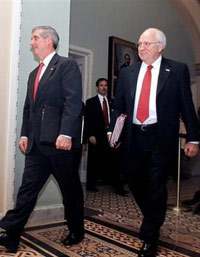|
US lawmakers demand spy program probe
(AP)
Updated: 2005-12-17 09:31
Dismayed US lawmakers demanded on Friday that Congress look into whether the
highly secretive National Security Agency was granted new powers to eavesdrop
without warrants on people inside the United States.
"There is no doubt that this is inappropriate," declared Republican Sen.
Arlen Specter of Pennsylvania, chairman of the Senate Judiciary Committee. He
promised hearings early next year.

US Vice President
Dick Cheney, right, leaves a briefing in the U.S. Capitol along with White
House Chief of Staff Andrew Card Friday, Dec. 16. 2005 after talking with
members of the Senate Intelligence Committee leadership. [AP]
| President Bush refused to discuss whether he had
authorized such domestic spying, saying to comment would tie his hands in
fighting terrorists.
Nor would other officials confirm or deny whether the nation's largest spy
agency was permitted to gather communications from Americans under a
presidential directive signed in 2002.
Instead, they asserted in careful terms that the president would do
everything in his power to protect the American people while safeguarding civil
liberties.
"I will make this point," Bush said in an interview with "The NewsHour with
Jim Lehrer." "That whatever I do to protect the American people 錕斤拷 and I have an
obligation to do so 錕斤拷 that we will uphold the law, and decisions made are made
understanding we have an obligation to protect the civil liberties of the
American people."
The reported program, first noted in Friday's New York Times, is said to
allow the agency to monitor international calls and e-mail messages of people
inside the United States. But the paper said the agency would still seek
warrants to snoop on purely domestic communications 錕斤拷 for example, Americans'
calls between New York and California.
"I want to know precisely what they did," said Specter. "How NSA utilized
their technical equipment, whose conversations they overheard, how many
conversations they overheard, what they did with the material, what purported
justification there was."
Sen. John McCain, R-Ariz., said he wanted to know exactly what is going on
before deciding whether an investigation is called for. "Theoretically, I
obviously wouldn't like it," he said of the program.
Sen. Russ Feingold, D-Wis., a member of the Judiciary Committee, said, "This
shocking revelation ought to send a chill down the spine of every American."
Vice President Dick Cheney and Bush chief of staff Andrew Card went to the
Capitol Friday to meet with congressional leaders and the top members of the
intelligence committees, who are often briefed on spy agencies' most classified
programs. The Times said they had been previously told of the program. Members
and their aides would not discuss the subject of the closed sessions Friday.
Some intelligence experts who believe in absolute presidential power argued
that Bush would have the authority to order searches without warrants under the
Constitution.
In a case unrelated to NSA eavesdropping in this country, the administration
has argued that the president has vast authority to order intelligence
surveillance without warrants "of foreign powers or their agents."
"Congress cannot by statute extinguish that constitutional authority," the
Justice Department said in a 2002 legal filing with the Foreign Intelligence
Surveillance Court of Review.
Other intelligence veterans found difficulty with the program in light of the
1978 Foreign Intelligence Surveillance Act, passed after the intelligence
community came under fire for spying on Americans. That law gives government 錕斤拷
with approval from a secretive U.S. court 錕斤拷 the authority to conduct covert
wiretaps and surveillance of suspected terrorists and spies.
In a written statement, NSA spokesman Don Weber said the agency would not
provide any information on the reported surveillance program. "We do not discuss
actual or alleged operational issues," he said.
Elizabeth Rindskopf Parker, former NSA general counsel, said it was troubling
that such a change would have been made by executive order, even if it turns out
to be within the law.
Parker, who has no direct knowledge of the program, said the effect could be
corrosive. "There are programs that do push the edge, and would be appropriate,
but will be thrown out," she said.
Prior to 9/11, the NSA typically limited its domestic surveillance activities
to foreign embassies and missions 錕斤拷 and obtained court orders for such
investigations. Much of its work was overseas, where thousands of people with
suspected terrorist ties or other valuable intelligence may be monitored.
The report surfaced as the administration and its GOP allies on Capitol Hill
were fighting to save provisions of the expiring USA Patriot Act that they
believe are key tools in the fight against terrorism. An attempt to rescue the
approach favored by the White House and Republicans failed on a procedural
vote.
|